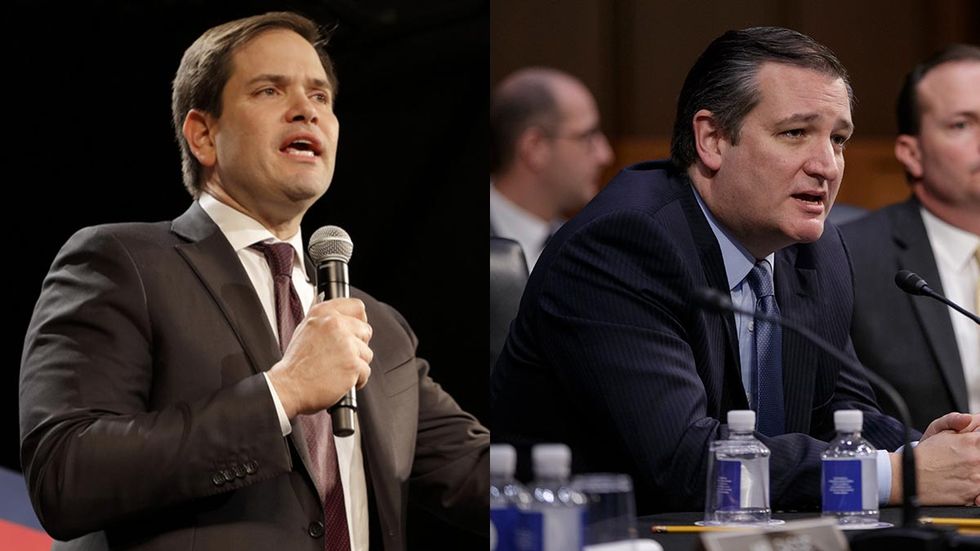
© 2024 Blaze Media LLC. All rights reserved.
Where to place our priorities — on sound public policy or shrewd politics?
This has been an ongoing debate within conservatism for years now, and both sides of it always have their champions. Currently two of them are Ted Cruz and Marco Rubio, and they each showed off the approaches they represent during the recent framing of the GOP's tax cut legislation.
Cruz is a favorite of the grassroots and a true believer in movement conservatism as public policy. That's why he focused his efforts on expanding tax-friendly 529 savings plans to include K-12 education — whether it be public, private, or home-schooling. That's textbook conservative public policy, which empowers families and not educrats, that you'd see advocated by a respected think tank like the Heritage Foundation.
Meanwhile, Rubio proved once again why he's preferred by many conservatives in the professional political class. He spent the final days before the legislation was finalized lobbying to expand child tax credits to lower-income families, who already pay little to nothing in income taxes. In other words, Rubio was advocating for what amounts to a welfare benefit.
Rubio is a smart guy, so he has to know this. But because he's smart, here's what Rubio also knows: The biggest reason people don't vote for Republicans isn't those dreaded social issues progressive party elders loathe, but rather the notion that the GOP hates the little guy and is "the party of the rich."
This also explains why populist messaging was one of the main reasons Donald Trump successfully outmaneuvered 16 other contenders in the 2016 GOP presidential primary — including Rubio. Having learned his lesson, Rubio tied his welfare state benefit to the planned decrease in corporate taxation (the sort of pro-growth policy Rubio has advocated in the past). Was he grandstanding? Of course, but that doesn't mean he's wrong.
Now movement conservatives, who prefer Cruz’s approach, will point out it's perilous for us to be seen perpetuating the Democrats' preferred class warfare game. That's why they prefer affirmatively conservative legislation like Cruz orchestrated to head it off at the pass — to take away government's power to pit groups and classes against each other by empowering individuals and families rather than the bureaucracy.
However, the Rubio wing will respond by saying something like this: "We won't win enough elections to do the conservative stuff you guys want, if we're not willing to navigate the political environment as it really is — not as we prefer it to be. And this is where much of the country is. Trump recognized this last year before any of us did, and it's a big reason why he's president now. And if he hadn't recognized it and won, we wouldn't be in the position we are now to pass this massive tax cut you guys all want. We'd have Madame President in office instead."
So which side is right?
While my sympathies certainly lie with the movement conservatism embodied by Cruz, we also cannot ignore the political realities Rubio was playing to last week. Despite what secularists on the Right would tell you, social conservatives aren't shrinking as a voting bloc nearly as much as limited government voters are. Outside the so-called smart set blogosphere, a thorough analysis of the 2016 electorate found such libertarian voters don't really exist.
Therefore, this debate is likely to rage on for the foreseeable future. Especially when you consider that Cruz and Rubio, each side's most talented and well known proxies, are both still relatively young politicians who aren't going anywhere any time soon.
Don't miss a minute of Steve Deace on CRTV! Sign up today!
Want to leave a tip?
We answer to you. Help keep our content free of advertisers and big tech censorship by leaving a tip today.
Want to join the conversation?
Already a subscriber?
BlazeTV Host
Steve Deace is the host of the “Steve Deace Show” and a columnist for Blaze News.
SteveDeaceShow
more stories
Sign up for the Blaze newsletter
By signing up, you agree to our Privacy Policy and Terms of Use, and agree to receive content that may sometimes include advertisements. You may opt out at any time.
© 2024 Blaze Media LLC. All rights reserved.
Get the stories that matter most delivered directly to your inbox.
By signing up, you agree to our Privacy Policy and Terms of Use, and agree to receive content that may sometimes include advertisements. You may opt out at any time.



